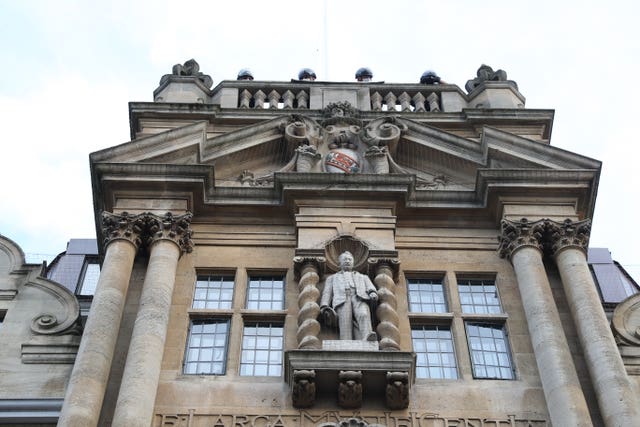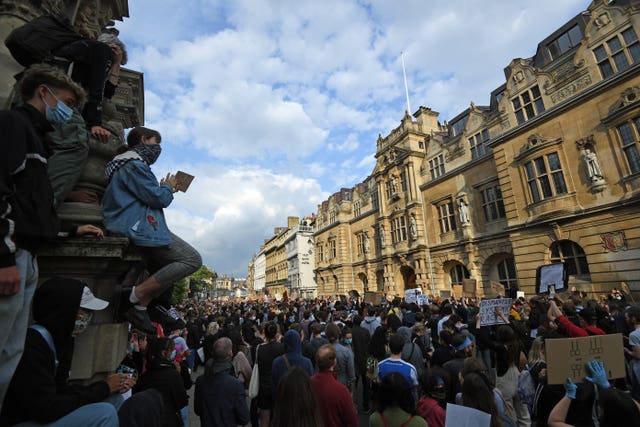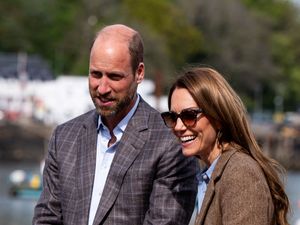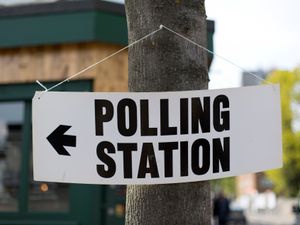Protesters block street in protest over Cecil Rhodes statue
Thousands of people have signed new petitions to have the Rhodes monument at Oxford University’s Oriel College taken down.

More than a thousand protesters blocked an Oxford street in a loud but peaceful anti-racism protest over the statue of an imperialist at a university college.
A campaign to remove the statue of colonialist Cecil Rhodes from the second floor of Oxford University’s Oriel College has gained renewed attention in recent days, with thousands signing new petitions to have the monument taken down.
Tuesday’s demonstration attracted around a thousand people as speakers called for the college to remove the statue from the High Street entrance of Oriel College and put it in context, as well as protesting against racism across society.
Ndjodi Ndeunyema, a law student and one of the organisers of Tuesday’s demonstration, said: “We are here to shame the college that seeks to venerate and glorify someone who is not worthy of glorification or veneration.
“We demand an official and public acknowledgement of the colonial violence on which Oriel is built.
“We demand the immediate removal of the statue of Cecil Rhodes.”
The Oxford protest comes after several Black Lives Matter protests nationwide, including a demonstration on Saturday where a statue of 17th century slave trader Edward Colston was pulled down and thrown into Bristol Harbour.
The demonstrations were sparked by the death of George Floyd at the hands of Minneapolis police.
At one moment during Tuesday’s peaceful protest, attendees spent eight minutes and 46 seconds silently sitting on the floor to mark Mr Floyd’s death.
In 2016, Oriel College decided to keep the statue despite widespread student demands to remove it.

University of Oxford associate professor of African politics Simukai Chigudu told the PA news agency: “This campaign has been important for a very long time, one of the challenges of being black in this country or belonging to a minority group is that you feel that your presence is unwelcome, and that’s true of Oxford University as well.
“The institution is structured according to a legacy and a culture that is very white and very elitist.”
Dr Chigudu added that the campaign to remove Rhodes’ statue could help highlight a deeper set of structural issues in society.
Several vans worth of police officers were in the area of the demonstration.
After the protest ended and numbers reduced, an officer in a blue liaison uniform knelt in the middle of the crowd and was met with cheers.
Many of the protesters wore masks or gloves at the demonstration while organisers also handed out masks and drew chalk crosses on the floor to encourage distancing – though protesters and journalists were in close proximity by the doors of the college.
Ahead of the protest, the leader of Oxford City Council Susan Brown invited the college to apply for planning permission to have the statue removed – despite its Grade II listed status.

She suggested the statue should be placed in the Ashmolean or the Museum of Oxford.
Labour councillor Dr Hosnieh Djafari-Marbini addressed the crowd and said the statue commemorated white supremacy.
She said: “I’m going to give the college a message from Oxford City Council – please do apply for planning permission to have the statue removed.”
Oriel College declined to comment on the letter when approached by PA, and instead pointed to a statement it made earlier in the day.
In the statement, the college said it supported the right to peaceful protest, adding: “We will continue to examine our practices and strive to improve them to ensure that Oriel is open to students and staff of all backgrounds, and we are determined to build a more equal and inclusive community and society.”





